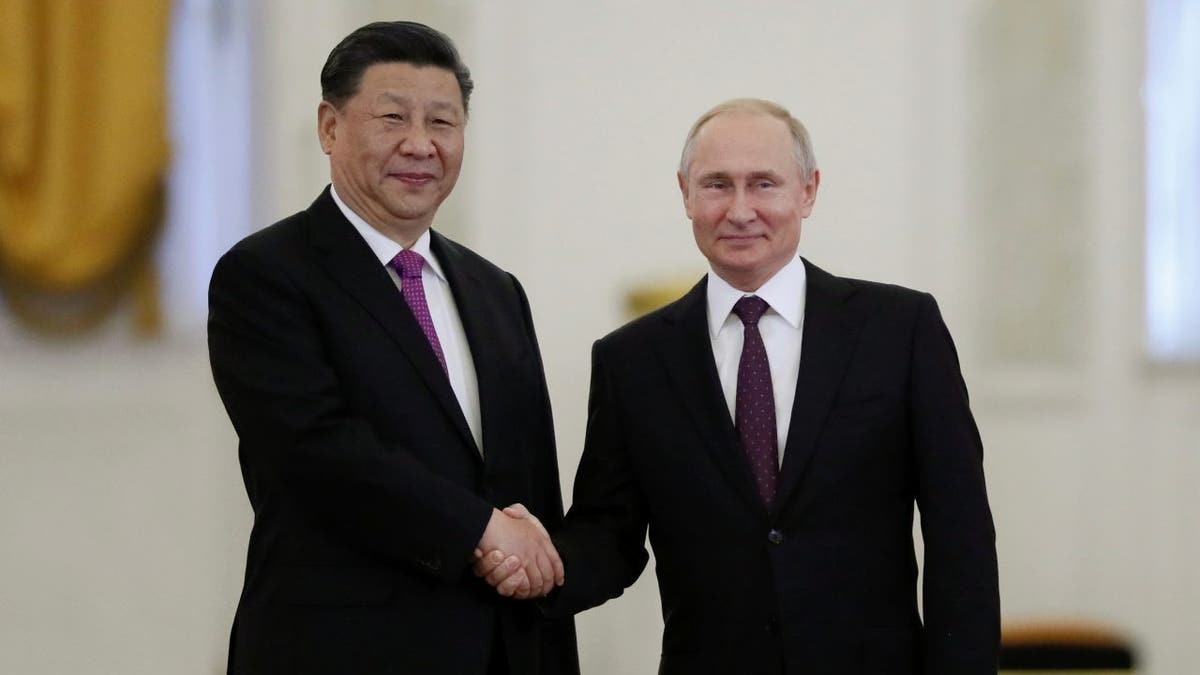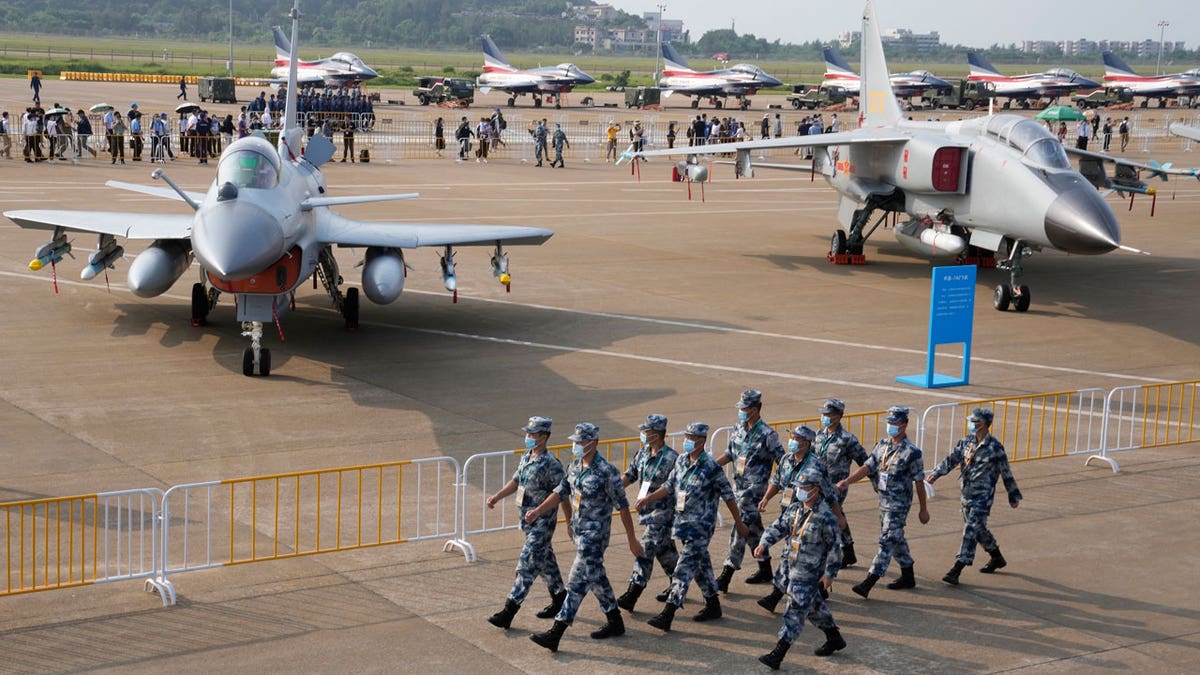Fox News Flash top headlines for February 24
Fox News Flash top headlines are here. Check out what's clicking on Foxnews.com.
Top foreign policy experts told Fox News Digital Thursday that China is "watching" to see how the U.S. and its Western allies handle Russian aggression against Ukraine and whether there is "any sign of weakness."
"They have done the calculus as to what this would ‘cost them’ if they were to move against Taiwan. And they are getting more data points now looking at what the West is doing now vis-à-vis Russia," said Heino Klinck, the former deputy assistant secretary of defense for East Asia during the Trump administration.
"It will inform and potentially shape Chinese decision-making," he continued in reference to the U.S. response in Eastern Europe. "Any sign of weakness…will be taken into account by the Chinese."
RUSSIA INVADES UKRAINE: LIVE UPDATES

Russian President Vladimir Putin shakes hands with his Chinese counterpart Xi Jinping at the Kremlin in Moscow, Russia, June 5, 2019. (REUTERS/Evgenia Novozhenina/Pool)
CHINESE MEDIA ACCIDENTALLY POSTS CCP RULES ON RUSSIA-UKRAINE COVERAGE, HINT AT TAIWAN TAKEOVER
Moscow’s aggression toward Kyiv prompted the U.S. and its Western allies to respond with severe sanctions and the deployment of Western forces to NATO-member nations that surround Russia, Belarus and Ukraine.
Critics of the Biden administration, like former President Trump, have claimed the inability to deter a Russian invasion will "embolden" China to act more aggressively toward Taiwan.
But Isaac Stone Fish, CEO of Strategy Risks, a China-focused risk firm, told Fox News he disagrees with this calculus.
"I think in some ways it’s the opposite," Stone Fish, who focuses on issues involving U.S.-China national security, said, adding that China could interpret increased military involvement in the Russian-Ukrainian conflict as opportune timing.
"They would calculate that the United States is unlikely to go to war with Russia over Ukraine and China over Taiwan at the same time. The more involved the United States gets in the Ukraine crisis from a military perspective, the more it incentivizes China to act now," he added.
Chinese President Xi Jinping and Russian President Vladimir Putin have expressed nostalgic desires to rebuild previous empires that were broken up during the 20th century – but experts argue this is where the parallel between the Russian-Ukraine conflict and Beijing’s desire for dominance over Taiwan ends.
The Chinese Communist Party (CCP) has long sought to reunify Taiwan, officially known as the Republic of China (ROC), with mainland China, but this goal has been met with opposition from Western nations like the U.S., the U.K. and Australia.
Taiwan has been described by Western allies as the beacon of democracy in Asia and identifies as a sovereign nation. But Taiwan is officially recognized by China, the United Nations and the U.S. as part of the one-China policy.

Chinese Air Force personnel march past the Chinese military's J10C fighter and JH-7A2 fighter bomber during 13th China International Aviation and Aerospace Exhibition, also known as Airshow China 2021, Wednesday, Sept. 29, 2021, in Zhuhai in southern China's Guangdong province. (AP Photo/Ng Han Guan)
RUSSIAN INVADES UKRAINE IN LARGEST EUROPEAN ATTACK SINCE WWII
The Chinese government has repeatedly pushed back on questions linking Ukraine with Taiwan and on Wednesday Foreign Ministry spokesperson Hua Chunying said, "Taiwan for sure is not Ukraine."
"Taiwan has always been an inalienable part of China. This is an indisputable legal and historical fact," she added.
The experts agreed that pushing a strategy of economic deterrence as witnessed in Europe by NATO would prove much more difficult with an adversary like China.
"What we see now in Europe demonstrates a failure of deterrence," Klinck said. "The West, in essence, used the threat of sanctions to try to push back on Putin’s military aggression, and it hasn’t worked."
"And the stakes, with respect to economic sanctions in a Ukraine-Russia scenario, are a lot less than they would be with China," he added.
Klinck, who also previously served as a military attaché in China, pointed to the challenge the U.S. encountered when convincing Germany to block the certification of the Nord Stream 2 pipeline in the face of Russia’s violation of international law.
"Could you imagine what it would be like to try and put together an international coalition that would be willing to levy meaningful economic sanctions against China when the Chinese economy is literally at least 10 times the size of the Russian economy?" he questioned.
"It demonstrates the limited value that sanctions can have in deterring an authoritarian regime," Klinck added.

In this handout photo taken from video released by Ukrainian Police Department Press Service, Military helicopters apparently Russian, fly over the outskirts of Kyiv, Ukraine, Thursday, Feb. 24, 2022. (Ukrainian Police Department Press Service via AP)
Stone Fish told Fox News Digital that it comes down to how China wants to be perceived on the global scale and not necessarily how its economy could be impacted by an international conflict over Taiwan.
"It’s less [about] its economy and more the perception of China in the eyes to the world as a responsible global player – a reputation that I would argue it doesn’t deserve – but China and Chinese companies and Chinese actors are far more integrated into the international system than Russia’s are," he said.
But Taiwan appears to remain concerned that China could seek an opportunity to take advantage of the current distraction in Eastern Europe by making a move on Taipei.
In a meeting with a working group regarding the Ukraine crisis this week, the Taiwanese president said military and security units "must raise their surveillance and early warning of military developments around the Taiwan Strait," according to a report by Reuters.
Former strategist at the Pentagon Matthew Kroenig, who also sits as a Vandenberg Coalition Advisory Board member, told Fox News Digital that fending off a Chinese invasion of Taiwan comes down to strategy.
"What we need is a defense strategy to defend our interests and peace and stability in both Europe and Asia," he said. "China should be the priority as it’s the biggest long-term threat, but the United States is still a global power we still have interest in Europe and the Middle East, and we can walk and chew gum at the same time."
Kroenig argued the best way to deter China from taking military action is to increase the U.S. naval presence in the region, beef up Taiwan’s missile striking abilities and encourage allies to do the same.
CLICK HERE TO GET THE FOX NEWS APP
The former Pentagon official also said the issue of nuclear deterrence needs to be leaned on more heavily if the U.S. is serious in preserving Taiwan’s autonomy from a Beijing aggression.
"I think we need to be prepared to deal with Russia in Europe and China in Asia at the same time," he added. "I think if Xi perceives a weak response in Ukraine he might take that as a green light."








































